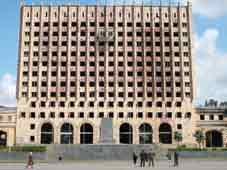Disputes clearer as details on German peace plan emerge
By Mikheil Svanidze
Thursday, July 24

The portions of the plan under public disagreement shed some light on the key issues—and hurdles—in negotiations over the breakaway region.
Most prominent is the question of a non-use of force agreement for the conflict zone, something Georgia has held out on signing.
The Berlin-backed peace plan, trotted out by the German foreign minister this month with the imprimatur of the UN secretary-general’s Group of Friends of Georgia, is not fully public. Reports of its contents, including from Vladimir Socor, an analyst with the Washington-based Jamestown Foundation writing on the text of the plan in the think-tank’s Eurasia Daily Monitor, say it includes a clause calling for the Abkhaz and Georgians to sign a non-use of force agreement.
Archil Gegeshidze of the Georgian Foundation for Strategic and International Studies also said this week the plan calls for that agreement.
Georgian President Mikheil Saakashvili has dismissed calls for a non-use of force pact as “pointless” and “an artificially-created issue,” saying there is no need for formal restraints on Tbilisi since it plans only peaceful actions. But this week Georgia’s ambassador to the UN, Irakli Alasania, clarified to reporters that Georgia was “never against…the signing of the declaration on non-resumption [of violence].”
Sokhumi and Moscow both say Georgia must sign the pact before any real progress can be made in the region.
Surprisingly, Alasania said that Tbilisi and Sokhumi worked on the text of such an agreement “a few months ago.”
Abkhaz authorities have publicly ruled out talks until the Georgians pull out their forces from Kodori Gorge, a Tbilisi-controlled portion of Abkhazia since 2006. The Abkhaz also said this month they would cut all ties with Tbilisi after a series of bomb attacks in the breakaway region which they blamed on Georgians.
Sergey Lavrov, the Russian foreign minister, spoke to the US secretary of state about Abkhazia at a regional summit in Singapore yesterday.
“We reiterated our absolute conviction that without urgent decisions on the non-use of force by the parties and steps directed at de-escalation of the situation in Kodori Gorge, it is hard to hope that trust will be restored and it will be possible to discuss all other issues, including, of course, the return of refugees and the issues of economic rehabilitation in the conflict zones,” said a Russian Foreign Ministry statement.
The chairman of Georgia’s parliamentary committee on conflict issues said yesterday that Georgia is willing to sign a non-use of force agreement, but only accompanied by Abkhaz guarantees of return for refugees.
The return of the hundreds of thousands of mostly Georgian refugees pushed out of Abkhazia during the secessionist conflict is another critical issue in dispute.
Lavrov, the Russian foreign minister, said last week that signing a treaty on the return of refugees is “unrealistic” at this stage.
Abkhaz officials say any refugee return should be limited for now to Gali district, the predominantly ethnic Georgian southern portion of Abkhazia where some refugees have already returned.
If an agreement does allow the return of refugees in meaningful numbers, Georgia says, the Russian peacekeeping force in Abkhazia would be incapable of securing their safety. Tbilisi is seeking to internationalize and demilitarize the peacekeeping contingent, something the Abkhaz reject, saying Russia is key for guaranteeing security in the region.
The German plan, according to Vladimir Socor, leaves room for the current peacekeeping format.
The third, and, according to Archil Gegeshidze, the most delicately contentious issue is the political status of Abkhazia—as either independent or part of Georgia—which the final stage of the plan reportedly looks at.
The German plan makes no mention of Georgian “territorial integrity,” according to Socor and comments from Tbilisi officials, a key phrase which signals support for the eventual return of Abkhazia, which is de jure Georgian territory, to Tbilisi’s control.
Sergey Shamba, the de facto Abkhaz foreign minister, said last week the lack of this phrase is a “positive element” in the plan. Abkhaz officials say they will accept nothing short of full independence from any peace plan.
Georgian Parliamentary Speaker Davit Bakradze said the “Georgian position is that the plan must in the first case guarantee territorial integrity, which the German side never questioned,” after meeting with the German foreign minister in Tbilisi last week.
Despite skepticism from the Abkhaz and Russians and some questions from the Georgians, peace talks based on the German plan are continuing, said Alasania, the Georgian envoy to the UN.
